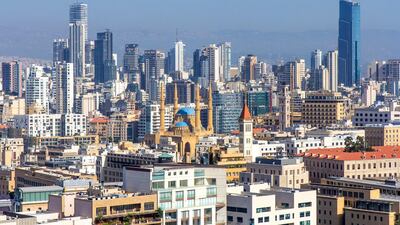The UAE has maintained its position as a leading investor in Lebanon, contributing 11 per cent of total foreign direct investment to the indebted country, a top Emirati diplomat said.
The second UAE-Lebanon Investment Forum, sponsored by the UAE Ministry of Economy and the Abu Dhabi Chamber of Commerce, will take place in Abu Dhabi on Monday.
Lebanese Prime Minister Saad Hariri will attend, along with several senior ministers and the governor of Lebanon's Central Bank. The first forum took place in December.
Mr Hariri will also meet a number of officials, including Sheikh Mohamed bin Zayed, Crown Prince of Abu Dhabi and Deputy Supreme Commander of the Armed Forces.
“The coming joint investment forum is a realisation of the vision of the UAE’s leadership for joint Arab action, especially with Lebanon," Hamad Al Shamsi, the UAE ambassador to Lebanon, told state news agency Wam.
About 29 per cent of the total foreign direct investment inflows to Lebanon were from the Middle East, Mr Al Shamsi said.
FDI flows to Lebanon increased to nearly $2.9 billion (Dh10.65bn) last year from $2.5bn in 2017, according to the World Investment Report 2019 from the UN Conference on Trade and Development.
Lebanon has been put on notice for a possible downgrade by Moody’s Investors Service and protesting citizens have demanded banks remove curbs limiting foreign currency withdrawals.
The country, which has $86bn of public debt as of the end of July, has one of the world’s highest debt-to-GDP ratios.
In a statement on Tuesday, the rating agency said it would put Lebanon’s Caa1 rating under review for a downgrade within three months.
Moody's said this was due to “the recent significant tightening in external financing conditions and the reversal in the bank deposit inflows that are essential in enabling Lebanon to meet the government’s financing needs”.
Private sector deposits at banks in Lebanon declined by $2.2bn, or 1.3 per cent, in the first seven months of the year.
Foreign investments in Lebanon are skewed towards real estate, hotels and tourism, which together accounted for 82 per cent of capital expenditure between 2003 and 2015, a 2018 background note for the Mena-OECD Economic Resilience Task Force said.
A large proportion of greenfield investment originates from GCC countries, with the UAE responsible for 50 per cent of the total, the note said.
“The UAE is also looking to expand investments to other areas, such as energy and free zones, because the UAE believes that Emirati investments in Lebanon will increase the confidence of investors from other countries to enter the Lebanese market, which will help Lebanon to overcome its current economic conditions,” Mr Al Shamsi said.
In the first seven months of this year, bilateral trade between the two countries stood at $598m, of which exports from the UAE accounted for $343m and exports from Lebanon were valued at $255m, Mr Al Shamsi said.
Last year, trade between the two was more than $1.04bn, of which exports from the UAE were $588m and exports from Lebanon $457m.
Fouad Dandan, the Lebanese ambassador to the UAE, told Wam that Lebanon's first oil and gas exploration opens up possibilities to further strengthen trade between the two countries.
"Lebanon is seeking the UAE’s expertise in its budding oil and gas sector as the first offshore drilling will start within three weeks," Mr Dandan said.


